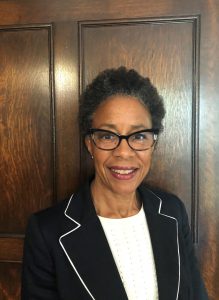
Through their work together at UCare, Dr. Julia Joseph-Di Caprio, Chief Medical Officer for UCare, and Pleasant Radford, Jr., Health Equity Officer for the health plan, are creating bridges that will bring about better care for diverse populations. The health plan is looking at everything from provider engagement to their internal functions to ensure health equity for members. The Council recently caught up with Julia and Pleasant to get their perspective on UCare’s health equity journey.
———
QUESTION: How long have you been with your organization and what’s been your journey to your role?
ANSWER: Julia – I’ve been with UCare since 2018 as SVP and chief medical officer. My health equity journey started even before I went to medical school in that I recognized early on that caring for people is connected to the way in which they live. Then as I went through medical school and began working at Hennepin County Medical Center, now known as Hennepin Healthcare, we knew that our work would only be successful if we address more than what was happening in the clinical context. It has only been more recently that I and many others have understood that structural racism (racist policies, procedures, systems) causes disparities in care and outcomes. Also, at UCare, we are fulfilling our role in addressing the social drivers of health and anti-racism within our work and with our provider partners.
Pleasant – I’ve been at UCare as the Health Equity Officer since 2020. I have always been fascinated at the fact that the United States spends a lot of money on health care, but our health outcomes are not much better than many other countries. My interest in health care began as a child because my mom was nurse, and so I got a chance to see her love for that work and the empathy she had for the patients she treated. My original plan was to be a medical doctor, but then I decided to take some time off before going to medical school to explore the world. Peace Corps was that opportunity. In that, I learned so much about public health. I realized in that small time that community plays a huge role in your health. I decided after that to focus more on the public health side instead of going to medical school. The jobs that I’ve had have really been a connective thread across that. Now, in my role at UCare as the Health Equity Officer, I’m leading this work to ensure that we are thinking of health and racial equity at a systemic level by working with and for communities to address their needs.

Q: Disparities in health care have always existed, but in your view, how have recent events – like the COVID-19 pandemic and the murder of George Floyd – impacted health equity work and where it is headed?
A: Pleasant – What we saw was greater cognitive dissonance between the idea of America and the reality of America. Many of us believe that America is the land of the free – that it is just, fair, and equitable. In fact, what we saw last year was the reality that America is not just, fair and equitable for everyone. I believe the murder of George Floyd served as the pinnacle where people realized: “I cannot believe that this is America.”
With COVID-19, people really saw the frailty of our health care infrastructure and how important public health is to improve the health of our communities. The pandemic allowed people more time to practice introspection and decide on what we need to change this. Both of these events – COVID-19 and George Floyd – impacted health equity because people now see how structural racism is a root cause. It is important for us to see the role that racism plays in healthcare, the role we play in enabling that system, and how we can start to change that system – the policies and procedures – to achieve health equity for all.
Julia – It wasn’t enough for people to say they were suffering from structural racism. People had to see someone murdered on camera before people would say “this is a thing.” I do believe the pandemic and its disproportionate effect on folks did advance the cause of addressing the structures that drive these impacts. I think the impact of the murder of George Floyd did accelerate things. I think our challenge now is to make this work even more sustainable over time. What I also reflect on is that, even for organizations like UCare that has years of partnerships with communities, some leaders are asking us about our commitment. We have to go with humility and recognize that many people have been advocating and doing this work for years, and we have to make sure that we take our direction from them. I also think we must honestly say that this is a curved path and there will be retrenching. I think we must recognize that even with all that happened over the last 15 months, we are not a point yet where this work is sustainable, and we need to build sustainability.
Q: What are some of the biggest barriers you see in delivering equitable care and what are steps that health plans can take remove those barriers and better connect with BIPOC communities?
A: Julia – I’ll speak to some of our core health plan work as it relates to ways in which we can remove barriers. For instance, with our work with providers, we will expect improvements in advancing health equity. I can see plans continuing to evolve and deepen that work including requirements around the diversity of the workforce in our partners. I could see core health care functions used to drive health equity.
Pleasant – Trust. I cannot emphasize that enough. There is a lack of trust in the health care system. That’s a huge barrier. If you are not able to trust the providers and the health care system to help in your journey toward optimal health, then it becomes difficult to stay healthy. Another part that I think is important to state is that health equity is a process and an outcome. We never completely “arrive” at health equity. We are constantly learning and re-learning. One barrier is that we often see it only as an outcome – we don’t respect the process that it takes to get there. You are going to make mistakes along the way. It is important to acknowledge those mistakes, say you’re sorry and continue to grow.
Q: What specific initiatives (committees, taskforces, work groups, cabinets, etc.) have been created at your organization to address health equity? And given these initiatives, what progress has been made in terms of making care more equitable?
A: Given the large number of members UCare serves who are most at risk of facing inequity, this work is embedded across many work groups, committees and subcommittees throughout UCare.
- UCare has a cross-department Health Equity Committee that identifies new opportunities, shares learnings and reviews updates on initiatives.
- Our Population Health team and subcommittees integrate health equity goals into all of their member health activities.
- Our Community Outreach teams contact members who face the most inequities to help them get their COVID-19 vaccines and connect them with community resources to avert social risk factors.
- Our Health Promotion Department has quite a few programs specifically directed to counter inequities especially around food insecurity.
- We are also kicking off an internal DEI work plan, which ties into health equity on all fronts. An Oversight Committee and Employee Advisory Committee helped drive and provide input for this plan.
Q: What role do you see partnerships (with the community, with the state, with others in the health care ecosystem, etc.) playing in advancing health equity efforts?
A: Pleasant – Partnerships are extremely important. It was one of the main reasons why I joined UCare. We have such a strong history of partnerships with the community. As I think about health equity, partnerships are the foundation of that. I believe partnerships help evolve and broaden our reach to strengthen our impact. As organizations, we see things through a certain lens, but it is not the only lens that will solve a problem or create a solution. Partnerships are key so that we leverage the unique assets and strengths we have to offer. They also allow us to contextualize health care and health equity within communities so that we better understand what is the right solution to reach optimal health. Partnerships teach us humility. We don’t know everything, so they allow us the learning and dialogue that must take place. Ultimately, our partnerships make us stronger in our work.
Julia – Some examples of partnerships include our work with the Minnesota Medical Association, funding their initiative to improve health equity, and Stratis Health, funding their work on their Culture Care Connection website. It is designed to help health care professionals by providing tools and resources to help them be responsive and supportive of the diverse patients they serve.
Q: What role does organizational culture and diverse staffing play in health equity? How can health plans use cultural competencies to improve health outcomes?
A. Pleasant – Organizational culture is so important. It undergirds how we operate, think and create policies, processes, and procedures for employees. As we think about health equity and culture, it’s important that our culture reflects the communities that we serve. We have to ensure that we have the right people in the right conversations to make the right decisions. When we make the wrong decisions, it costs time, money and lives. A diverse staff improves our work, our culture and the health of our employees and members.
Julia – The COVID vaccination development is a prime example of how quickly systems were able to adapt to the pandemic and provide care using significant technologies like ECMO and other things. That makes what happened last year so stark. You wonder if people brought the best thoughts to bear around the social drivers of health and advancing racial and health equity, would last year had been such a disgrace? Because that came from years of not addressing what we knew needed to be addressed. We need to bring the best minds to bear, which means diverse thinking, like we have for other health issues. If we brought that same thinking to bear in terms of advancing health equity, we would be able to solve it.
Q: Distrust in the health care system continues to be a huge challenge when it comes to health equity, which has been laid bare by lower COVID vaccination rates in communities of color, but impacts other care, also. How do we rebuild trust in BIPOC communities?
A: Pleasant – We have to combat a deficit-based mindset. If all you see are the stereotypes of an individual or community versus looking at them from an asset-based perspective – in the sense that they have a lot to offer and we can learn a lot from them – this will be a barrier. We have to ask ourselves: How can I be humble and engage in a dialogue with this person so we can offer equitable care? It will be important to take those steps so that we can continue to build that trust in our communities of color.